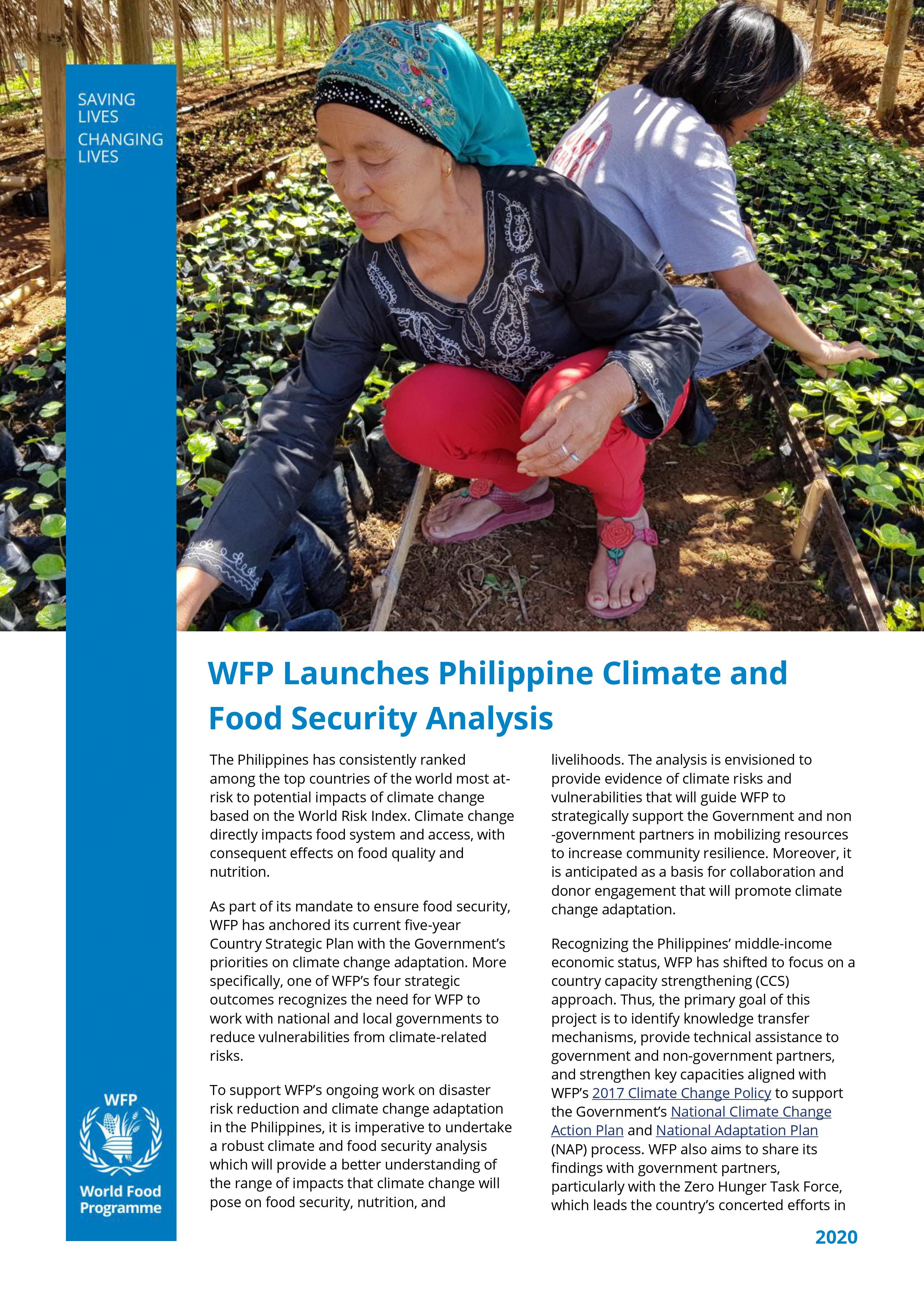
December 21, 2020 Monday

WFP Philippines: Launch of Climate and Food Security Analysis – 2020. Access the factsheet through this link: https://www.wfp.org/publications/wfp-philippines-launch-climate-and-food-security-analysis-2020
MANILA, 22 December 2020 —The Climate Change Commission (CCC) joined various government agencies, experts from different industries, advocates for climate resilience, and members of the academe to launch, “Climate Change and Food Security Analysis,” a research initiative created by the World Food Programme (WFP) to determine the impacts of climate change to food security, nutrition and livelihood in the Philippines and to identify the appropriate solutions.
The virtual event featured Mr. Mats Persson, OIC and Deputy Country Director, World Food Programme; Mr. Stephen Weise, Managing Director, Alliance of Biodiversity and International Center for Tropical Agriculture (CIAT); the Office of Cabinet Secretary Karlo Nograles, head of the Zero Hunger Task Force in the Office of the President; Director Alicia Ilagan, Department of Agriculture; Director Restituto Macuto, Sustainable Livelihood Program and National Program Manager of EPAHP NPMO, Department of Social Welfare and Development (DSWD); Dr. Azucena Dayanghirang, Executive Director, National Nutrition Council; and Mr. Jerome Ilagan, Chief of Policy Research and Development Division, Climate Change Commission (CCC).
The virtual event was held to formally launch the Climate Change and Food Security Analysis, including the introduction of its objectives, time, and expected outputs. Likewise, the event aimed to generate interest in the study by making the argument for climate change and its impact on food security in vulnerable communities.
The report reveals that aside from conflict, climate change is one of the main drivers of global hunger. Climate change impacts are also undermining agricultural production. Particularly vulnerable are smallholder farmers living in the earth’s more fragile environments. More than 80% of the world’s most food-insecure people are being hit by extreme weather such as drought and flooding, as well as by other stresses such as pest infestation and land degradation. Changes in climate are affecting the production of staple crops—wheat, rice and maize—in both tropical and temperate regions. This situation is set to worsen as temperature increases and becomes more extreme, and rainfall becomes more unpredictable.
In his opening statement, Mr. Persson said, “Climate variability and extreme weather events are among the key drivers behind the recent increase in global hunger and one of the leading causes of severe food crisis. To fill in the undeniable gap between climate change and food insecurity, WFP forged a partnership with the International Center for Tropical Agriculture and initiated a research study of the Philippines Climate and Food Security Analysis.”
Dr. Weise said, “It is evident that the climate is impacting food security in ways and in intensity we have not experienced before. Just this year, for example, the Philippines had to bear the brunt of multiple typhoons that took lives, and caused damage and losses worth billions of pesos in the agriculture sector. If anything, this is a signal for organizations like ours to work closely together along with national authorities and institutions to build greater resilience in the food systems of the Philippines.”
In 2020, President Rodrigo Duterte signed Executive Order No. 101 which created the Inter-Agency Task Force on Zero Hunger (IATFZH). This aims to put an end to the hunger problem in the country by 2030. The WFP has extended its support of this Task Force and its initiatives to help the country achieve its goals.
Mr. Ilagan commended the Climate and Food Security Analysis as it is consistent with the country’s Nationally Determined Contributions under the Paris Agreement. On the promise of food security, he expects that the results of the analysis will lead to a complementary and anticipatory adaptation mechanism that is founded on scientific drivers presented in partnership with the Intergovernmental Panel on Climate Change (IPCC) and local experts.
He added that, “The National Panel of Technical Experts from the Climate Change Commission can also share their views on how to do multi-scenario, multi-hazard impact projections; inasmuch as the productivity of the sector lies not only on the natural hazards but the complementary implications of other growth drivers such as land use, land industry optimization and incentives, green jobs creation, and the building of people's movements so that they could start investing consistently with the Agriculture and Fisheries Modernization Act.”
Although the launch of the Philippines Climate and Food Security Analysis was delayed due to the COVID-19 crisis, attendees of the virtual event have stated that this should not impact the goal of the study. Likewise, they hope that the pandemic will provide additional aspects for critical analysis on food security and climate change.
This virtual event was organized by WFP in partnership with the CIAT, with the participation of the Zero Hunger Task Force.